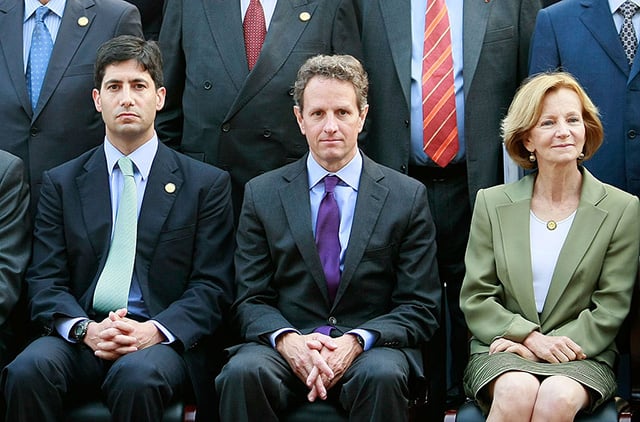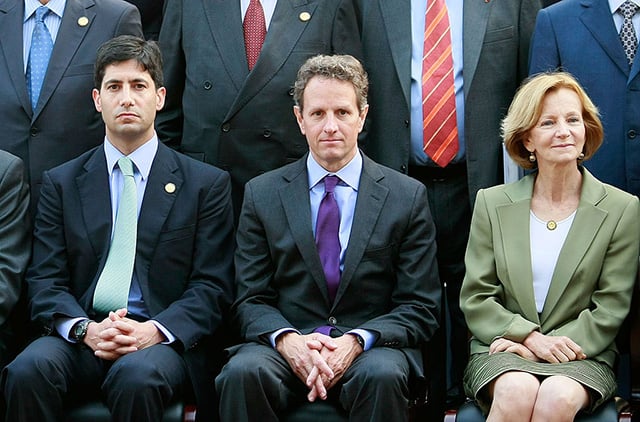
Did you know that Truthout is a nonprofit and independently funded by readers like you? If you value what we do, please support our work with a donation.
 Central bank deputy governor Kevin Warsh (Left), US Treasury Secretary Timothy Geithner (Center) and EU Finance Minister Elena Salgado (Right) attend during the photo session befire their meeting the the G20 Financial Ministers and Central Governors meeting at Paradise Hotel on June 4, 2010, in Busan, South Korea. (Photo: Chung Sung-Jun / Getty Images)
Central bank deputy governor Kevin Warsh (Left), US Treasury Secretary Timothy Geithner (Center) and EU Finance Minister Elena Salgado (Right) attend during the photo session befire their meeting the the G20 Financial Ministers and Central Governors meeting at Paradise Hotel on June 4, 2010, in Busan, South Korea. (Photo: Chung Sung-Jun / Getty Images)
Since the dawn of time men have married into prominent families as a way to improve their career prospects, but as Jared Kushner can attest, the returns to marrying well have never been greater. We may see further proof of this proposition if Donald Trump selects Kevin Warsh to replace Janet Yellen as chair of the Federal Reserve Board.
Like Kushner, Warsh’s secret to success seems to rest largely on the family he married into. Warsh’s father-in-law is the billionaire Ronald Lauder, the heir to the Estee Lauder cosmetics fortune and a major Republican Party donor.
If Warsh were picked his background would provide a sharp contrast to that of Janet Yellen. Yellen developed a reputation as a highly respected academic economist, having taught at both Berkeley and Harvard, and published dozens of articles in top journals. She went to Washington to become a member of the Fed’s Board of Governors under President Clinton and then served as the chair of his Council of Economic Advisers. She then served as president of the San Francisco Fed district bank, before being appointed as vice-chair by President Obama. She was elevated to chair in 2013 after Ben Bernanke completed his second term.
She not only has held top positions, but she has had a good track record in her performance in these positions. Notably, she began to be concerned about the fallout from the collapse of the housing bubble in early 2007.
This was late in the scheme of things (it would have been best to raise the concerns before the bubble had grown to such dangerous levels), but she was still ahead of her colleagues at the Fed. She also has been a consistent supporter of the various Fed policies designed to boost the economy out of the recession, which by almost all accounts have had a positive effect on growth and employment.
By contrast, Warsh is a lawyer, not an economist. He worked at the Morgan Stanley investment bank until 2002, when he went to take a mid-level economics position in the George W. Bush administration. Bush appointed him as a Fed governor in 2006, where he served until 2011. Since then he has been a visiting fellow at Stanford and served on various corporate boards.
In his stint as a Fed governor he managed to get just about everything wrong in the events leading up to the financial crisis and in its aftermath. In a speech given in March of 2007, as the housing bubble was already rapidly deflating and the financial markets were becoming increasingly volatile, Warsh touted the explosion in credit default swaps and other derivative instruments. He argued that these instruments facilitated hedging and diversification, completely missing the problems that would arise in these poorly regulated markets over the next year and a half.
Having managed to overlook the growth of an $8 trillion bubble in the housing market and the dodgy financial engineering that supported it, Warsh sought to undermine Fed efforts to boost the recovery from the Great Recession. As early as October of 2008, when the economy was literally collapsing, Warsh was already expressing skepticism about the ability of fiscal stimulus to provide much support. He even pointed to some labor market data to argue that the economy may not be in that much trouble. (The data he cited reported on labor market conditions before the collapse of Lehman.)
His failure to recognize the severity of the downturn and to take seriously the consequences of mass unemployment continued into 2009. In September of that year, before unemployment had even peaked, Warsh was already worried about the need to reverse the stimulus the Fed had provide to the economy, in order to prevent renewed inflation. He continued to oppose the Fed’s efforts to boost the economy, constantly expressing concerns about inflation, until he resigned his position early in 2011. In one notable instance he denounced the Fed’s quantitative easing policy in a column in the Wall Street Journal just after he had voted for it at a meeting of the Fed’s Open Market Committee.
Since leaving the Fed, Warsh has continued to criticize the Fed’s efforts to stimulate the economy. While his obsession with inflation has proven to be completely unwarranted — the inflation rate is still below the Fed’s 2 percent target — he has found new reasons to complain about the policy. In a Wall Street Journal column he co-authored two years ago, he bizarrely argued that high stock prices and low interest rates were somehow impeding investment.
While there are considerable grounds for criticizing the Fed’s performance in recent decades, the people who were appointed as chair all had clear credentials that would justify their selection. That is not the case with Kevin Warsh. More importantly, when he has been in a position to weigh in on the key economic policy issues of the time, he has a near-perfect track record of being almost 100 percent wrong. The only obvious thing that Warsh seems to have going for him is that he married into a good family.
A terrifying moment. We appeal for your support.
In the last weeks, we have witnessed an authoritarian assault on communities in Minnesota and across the nation.
The need for truthful, grassroots reporting is urgent at this cataclysmic historical moment. Yet, Trump-aligned billionaires and other allies have taken over many legacy media outlets — the culmination of a decades-long campaign to place control of the narrative into the hands of the political right.
We refuse to let Trump’s blatant propaganda machine go unchecked. Untethered to corporate ownership or advertisers, Truthout remains fearless in our reporting and our determination to use journalism as a tool for justice.
But we need your help just to fund our basic expenses. Over 80 percent of Truthout’s funding comes from small individual donations from our community of readers, and over a third of our total budget is supported by recurring monthly donors.
Truthout’s fundraiser ended last night, and we fell just short of our goal. But your support still matters immensely. Whether you can make a small monthly donation or a larger one-time gift, Truthout only works with your help.